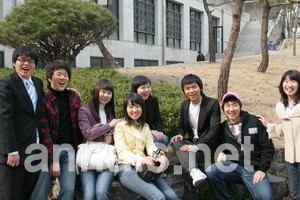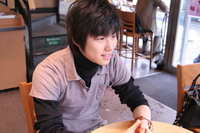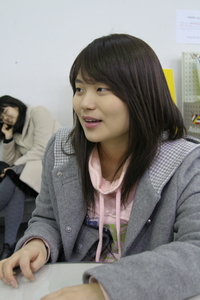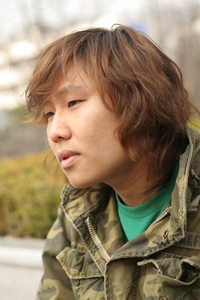Dongahree on a move
THE BEGINNING of the semester has already passed us by and April is just around the corner. After stepping into the university campus many things look different from the trees to the cars to the people walking to class. There are so many possibilities and directions opened to newly entered university students and most of the time the choices they make decide whether their campus life will be enthusiastic or tasteless. Dongahree is also one of the factors which will influence one’s college life.
 | ||
| "We are dongharee members!" |
Dongahree
Dongahree. To a contemporary who attended school, this word could recall the pain from heart breaking crushes. Maybe there are some who lost touch a long time ago but, there are those who are still in touch with old dongahree members. In Kim Doo-su’s, (Present Director of People’s Solidarity for Participatory Democracy) writing, “Those who dream change the world,” he describes well what dongahree meant to him and how it was in his school days. “I definitely remember my school days as being warmhearted and having firm belief in myself. Since I came from a poor farming family, I always felt a shortage of money and food, and it was in my dongahree where I blew off all those shortages. It was a strongly united group with integrity and loyalty from all members.”
Dongahree can be compared to a society; they both meet the needs of its members. Dongahree satisfies 3 main desires of university students.
The first one is safeness. Members of dongahree feel the same kind of attachment as member of society because there is a strong sense of belonging in each. People are likely to feel safe and settled in an affiliated community. Another need is to fulfill the desire of being cared for through intimate relationships. Sunbae tries to take care of Hubae by giving useful advice about campus life and making strong ties between them. Whenever Hubae encounters difficulties they feel warm and safe knowing that Sunbae is watching their back. “We share agonies with each other because Sunbae is the previous generation who might have under went not only the same nameless longings and anguish of youth. Not to mention the worries about the future to come; and it’s true they are a great help apart from parents” said Park Ji-won, the President of Drama club, Limelight (Jr., Seoul National University).
 | ||
| President of Limelight |
The last thing is the desire of self-realization and self-development. One gets to realize oneself and be socialized by finding one’s position in society. Likewise, joining related dongahree helps one in a lot of ways by triggering the realization of what one should aim for and desire in a life time. There are some who learned to unveil their ability in certain fields by joining dongahree.
How it developed
In a community with people who are most susceptible of following the general trend of public opinion, it is easy to impact the trend of the society. Whether or not a dongahree reflects the latest cultural and social trend or if those trends affect the most on the flourishing and depriving of dongahree, no one can be sure. However there has been a general tendency of dongahree in Korea’s universities.
In the 1960-1970’s a few chosen students had the right to attend university because there were a few students who could afford the university tuition. These students developed their unique dongahree culture related to pure literature by publishing literature collections like the Yonsei Literature Forum, the very first dongahree founded in 1940 in Yonsei University. In the 1980’s, when the military dictatorship had started, the focus of the dongahree began to address social problems and reformation of high positions in Korea’s decayed societies during those times. It becomes clear when we look into the historical case of Kwangju Student Movement, many university dongahrees attempted to make their political convictions come true. Songs had become an important way to confidentially deliver messages and to revolt against the military dictatorship since the 1980’s. After some degree of liberty in society came about, no more implicative songs were needed but the melody remained. And distinctively in 1990, music, especially singing dongahrees such as “Seekers for Songs” rose in popularity.
In the 1990’s, after the democratization movement mainly led by university students was successful, students’ interest focused of the of unification of North and South Korea and they put this issue into the discussion between them.
As the internet came into students’ routine life in 2000’s, students’ matters of concerns have become broader and more diverse than ever before. Korea gained stability in society as well as in politics and naturally students’ became apathetic towards politics. Students started to show interest in diverse values of society other than political issues, more and more students became oriented in self-interest and self-development; it led to the birth of practical dongahrees- common dongahrees which we can easily find all around us such as marketing, leadership, and studying English. These dongahrees are either directly or indirectly related to employment.
Dongahrees now
Equal time is given to everyone and it depends on individuals to make time valuable and to make the most of it. Many students want to spend their campus life in a way to help one’s career record, substantially. Students tend to think one of its methods is to join the *dongahree* which can help you develop your career by developing your inner and outer strengths
Recently, dongahrees most appealing to students are those related to visible achievements such as getting a certification, having a remarkable public performance, or publishing something which can be the stepping stones to one’s career. For example, IYC(International Yonsei Community), dongahree, which was founded in 1995 to develop cultural exchange between various nationalities’ students and break down the invisible block that stands between cultures, has been recently inundated with applicants. We are putting more emphasis on the helpfulness of IYC especially with multinational corporations that want to hire students with international exchange experience and a global mind-set,” said the president of IYC, Oh Su-jin (Soph., Dept. of Political Science).
 | ||
| President of IYC |
A representative dongahree which lays its fundamental goal in providing the best opportunity and career for employment is YLC (Young Leader’s Club) which is sponsored by FKI (the Foundation of Korean Industry). YLC devises programs and provides lectures for dongahree members. Experts on certain subjects, especially concept of free economy market, are hired to provide professional knowledge to members. There are already 500 active members, very systemically organized with ten branches- seven in Seoul, and three in provincial subdivisions-with 50-60 members each.
Employment or studying English is no longer the urgent matter for seniors. More and more freshmen are getting involved and getting interested in these matters. There are more dongahrees got its birth related to employment and self-development in the late ten years. But the problem is that those people who are attending these dongahrees are not laying their first priority in participating dongahree activity itself but to find a job or make themselves more marketable. Accordingly these kind of dongahrees don’t last long enough to make personal and intimate relationships according to the President of Yonsei dongahree Union, Platform, Kim Sae-hyun(Sr., Col. of Social Science)
 | ||
| President of Yonsei Dongahree Union |
Why are there so many dongahrees related to employment giving birth in campus? First of all, this phenomenon can be perceived as a consequent of the social phenomenon of modern times. Korea’s economy has been developing since the 1960’s. So many students with a higher level of academic ability than the average university graduate of 10 years ago are springing up everywhere. With limited positions for new university graduates, the problem of finding a job arose. Competition between university students is such a natural thing. During the IMF (International Monetary Fund) restructuring period in the last 1990’s, many of Korean firms went bankrupt and downsized. From that time on, possible job positions all over Korea declined steeply.
Causes are also found from students themselves in that they join dongahrees not because of their interest or aptitude in the dongahree but the fact that it looks good on a resume. Whether it fits or not, they sometimes try to join many dongahrees; most of them are not able to adapt themselves to the dongahrees and soon drop out from them.
Hope dongahrees to be
Like a degraded society does not degraded its citizens, the same goes for dongahrees. However a dongahree is developed in a mono-oriented way, not all the students are interested or agree with those dongahrees. Some might get easily tired of it because of the shallow relationships they develop with other members and coherent and too well organized policy of those dongahrees. But still is hard to tell if students can reform the overall atmosphere little by little throughout all those dongahrees. Though the pillar stays, it is perceived to be at stunning point these days in that there are certain trends in dongahrees in campus. Students are tending to show more interest in some dongahrees that are in brand new fields such as skin-scuba diving, ice-hockey, fortune telling, and gourmet tour which they haven’t joined before or which they have exceedingly personal interest. It means more and more students have a tendency to join dongahrees which develops their aptitude and grabs their attention. Students' search for dongahrees whch do not pressure them to participate regularly and make them obsessed never ends despite dongahrees' irrelevancy with self-development or employment," said the reporter of Daehak Naeil, Moon Kyung-sun. University year is a little too short for us to carry on. During this time why don't we give ourselves a chance to let dongahree be the oasis of our dry and monotonous campus life?
*sunbae:: students in university who are older
*hubae: students in university who are usually younger
<Survey on Yonseians’ Mind on *Dongahree*>
Yonsei Annals conducted a survey on consciousness on *dongahree*s of 100 Yonseians, 50 of freshmen and 50 of non-freshmen and we have got interesting result on this. There showed a big difference in proportion of those who have a mind in joining *dongahree * between freshmen and non-freshmen that 82.4% of freshmen have an intention to participate in *dongahree * activity while only the half of non freshmen showed interest in *dongahree * activity.
1, Do you join *dongahree*s or have plan to join *dongharee*s?
1) yes (67.3%)
2) no (32.7%)
1.Why do you join *donahree*s? (All Yonseians)
1) fulfilling one's interest (48.6%)
2) self-development (18.6%)
3) personal networking (12.9%)
4) getting bored on *ban* activity (8.5%)
5) helpfulness for employment (8.5%)
6) others (2.9%)
2. What kind of *dongahree* are you interested in?
(신입생과 비신입생을 양 쪽에 비교하면서 나타내주세요)
Freshmen
1) performance(41.2%)
2) cultrural exchange (11.8%)
3) broadcasting and journalism (13.7%)
4) advertiseing, marketing (9.8%)
5) finantial technology (7.8%)
6) etc (15.7%)
Non-Freshmen
1) performance (18.9%)
2) cultural exchange (5.7%)
3) broadcasting and journalism (13.2%)
4) advertiseing, marketing (29.5%)
5) finantial technology (21.3%)
6) etc (11.4%)
3. What factor do you think it's essential in choosing *dongahree*? (All Yonseians)
1) fulfilling one's interest and aptitude (29.8%)
2) self-development that is necessary in employment(27.8%)
3) personal but broad network (25.6%)
4) cultivating one's mind (8.7%)
5) etc (8.1%)


un'idea su dove posso comprare i pannelli solari? Quale e la migliore
azienda? Ogni consiglio e ben accettato. Grazie